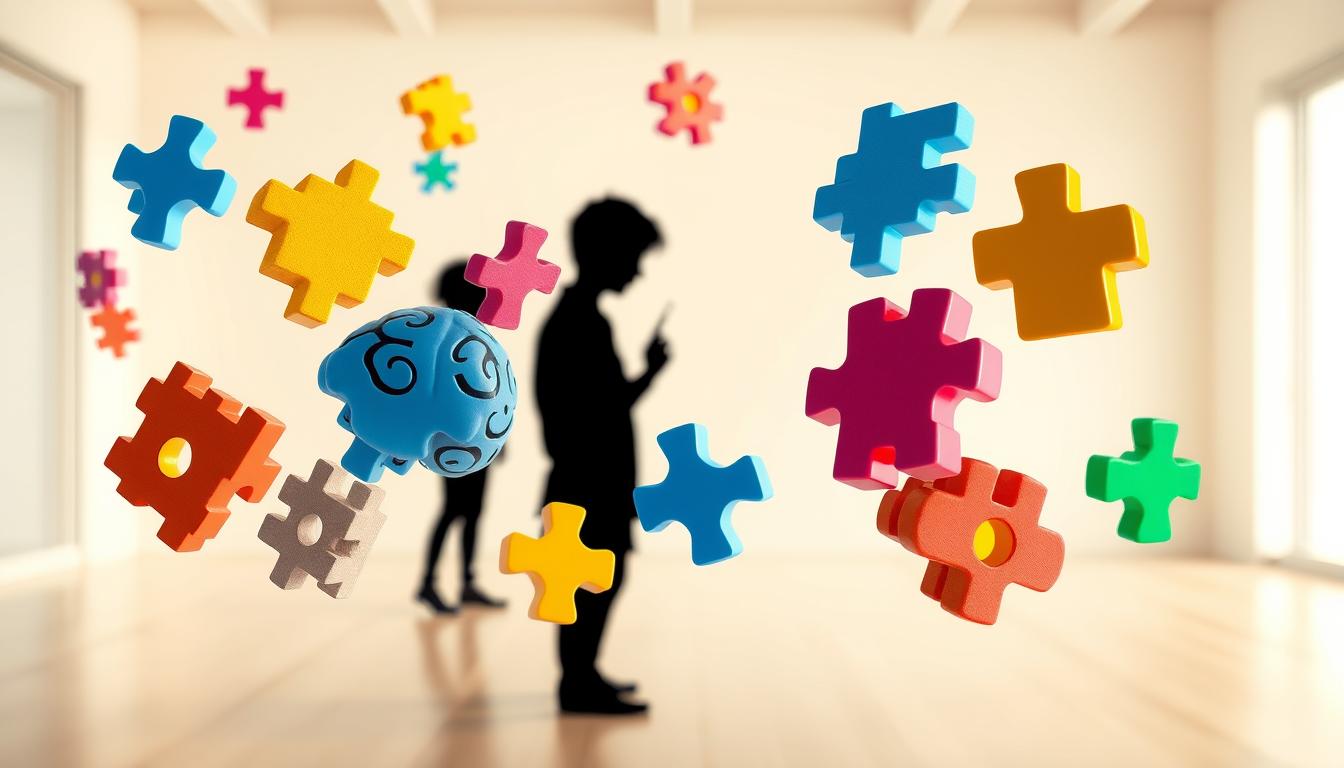Engaging in brain training games can significantly enhance cognitive abilities, making it easier to concentrate and think critically. These games are designed to challenge the mind, promoting cognitive enhancement and better focus.
With a wide variety of games for focus available, individuals can choose the ones that best suit their needs, whether it’s to boost memory, attention, or processing speed. This article will explore the diverse range of games that can lead to cognitive improvement.
Key Takeaways
- Engage in brain training games to enhance cognitive abilities.
- Improve focus and concentration with targeted games.
- Boost memory and processing speed with cognitive training.
- Choose games that suit your cognitive needs.
- Enhance critical thinking with challenging brain games.
The Science Behind Brain-Training Games
The effectiveness of brain-training games in enhancing cognitive abilities is rooted in their ability to challenge and adapt to our brain’s capabilities. These games are designed to engage various cognitive functions, from memory and attention to problem-solving and decision-making.
How Games Affect Neural Pathways
Brain-training games stimulate neural pathways, promoting communication between different parts of the brain. By challenging these pathways, games can strengthen connections and even create new ones, enhancing overall brain function.
Neuroplasticity and Cognitive Enhancement
The concept of neuroplasticity is central to understanding how brain-training games work. Neuroplasticity refers to the brain’s ability to change and adapt as a result of experience. Games that challenge the brain can foster this adaptability, leading to cognitive enhancement.
Research-Backed Benefits of Game-Based Learning
Research supports the benefits of game-based learning, showing that it can lead to significant improvements in cognitive function. Studies have demonstrated that engaging in brain-training games can enhance memory, boost attention, and improve problem-solving skills.
Strategy Board Games for Critical Thinking
Engaging in strategy board games is a proven method to enhance critical thinking skills. These games challenge players to think ahead, make informed decisions, and often require a deep level of strategic planning.
Chess: The Ultimate Brain Workout
Chess is widely regarded as one of the most effective games for improving cognitive function. It demands players to think critically, anticipate their opponent’s moves, and adjust their strategy accordingly. Regularly playing Chess can enhance problem-solving skills and improve memory.
Go and Othello: Pattern Recognition Masters
Games like Go and Othello are masters of pattern recognition. They require players to understand complex patterns and anticipate their opponent’s strategy. These games enhance spatial awareness and improve cognitive flexibility.
Modern Strategy Games: Catan, Pandemic, and Ticket to Ride
Modern strategy board games such as Catan, Pandemic, and Ticket to Ride offer a fresh take on traditional strategic gameplay. They promote critical thinking, resource management, and often involve social interaction, making them excellent for developing a range of cognitive skills.
By incorporating these games into your routine, you can significantly improve your critical thinking and problem-solving abilities, making them a valuable addition to any cognitive enhancement program.
Puzzle Games That Enhance Problem-Solving Skills
Enhancing problem-solving skills can be achieved through the engaging world of puzzle games. These games are not only entertaining but also provide a cognitive workout that can improve various aspects of mental functioning.
Sudoku and Number Puzzles
Sudoku and other number puzzles are excellent for enhancing logical reasoning. They require players to use logic to fill in missing numbers, promoting critical thinking and problem-solving skills.
Crosswords for Verbal Reasoning
Crosswords are another popular puzzle type that improves verbal reasoning. By figuring out clues to fill in the correct words, players enhance their vocabulary and linguistic skills.
Jigsaw Puzzles for Spatial Awareness
Jigsaw puzzles are great for developing spatial awareness. They require players to fit pieces together to form a complete picture, enhancing visual processing and spatial reasoning.
Difficulty Levels and Brain Benefits
The difficulty level of puzzle games can significantly impact their brain benefits. Here are some key points to consider:
- Increasing difficulty levels can lead to greater cognitive improvement.
- Regularly challenging oneself with more complex puzzles can enhance problem-solving skills.
- Starting with easier puzzles and gradually moving to harder ones can help build confidence and cognitive resilience.
By incorporating puzzle games into your routine, you can enjoy a fun and effective way to boost your problem-solving skills. Whether it’s Sudoku, crosswords, or jigsaw puzzles, there’s a puzzle game out there for everyone.
Digital Brain Training Apps and Platforms
The rise of digital brain training apps has revolutionized the way we approach cognitive enhancement, offering personalized and engaging experiences. With numerous options available, it’s essential to explore the features and benefits of popular platforms.
Lumosity and Similar Cognitive Training Programs
Lumosity is one of the pioneers in digital brain training, offering a wide range of games and exercises tailored to different cognitive skills. Its comprehensive approach includes attention, memory, and problem-solving tasks. Other similar programs include Cogmed and BrainHQ, which also provide structured cognitive training.
“Lumosity’s games are designed to challenge and engage users, making cognitive training a fun and enjoyable experience.”
— Lumosity User Review
Peak: Personalized Brain Training
Peak is another highly-regarded app that focuses on personalized brain training. It uses AI to tailor workouts based on individual performance and progress. Peak’s library includes games for memory, attention, and mental agility, making it a versatile tool for cognitive enhancement.
Elevate: Daily Brain Training Challenges
Elevate is known for its daily training challenges that target various cognitive skills, including reading, writing, and math. It’s designed to improve productivity and cognitive function through consistent practice. Elevate also tracks progress, providing insights into areas of improvement.
Free vs. Premium Options
Most digital brain training apps, including Lumosity, Peak, and Elevate, offer both free and premium subscription models. The free versions typically provide limited access to games and features, while premium subscriptions unlock full potential, including personalized coaching and detailed progress tracking.
| App | Free Features | Premium Features |
|---|---|---|
| Lumosity | Limited games, basic tracking | Full game library, personalized coaching |
| Peak | Basic workouts, limited games | Advanced workouts, detailed progress |
| Elevate | Daily challenges, basic tracking | Customized challenges, detailed insights |
When choosing a digital brain training app, consider what features are most important to you. Whether it’s personalized training, a wide range of games, or detailed progress tracking, there’s an app designed to meet your cognitive enhancement needs.
Memory-Boosting Games for All Ages
Engage your mind with a variety of games designed to improve memory across all age groups. Memory-boosting games are not only fun but also provide a significant cognitive boost, helping individuals of all ages to improve their memory and concentration.
Classic Memory Card Games
Classic memory card games have been a staple for improving memory for decades. Games like Concentration, where players flip cards to find matching pairs, enhance memory recall and concentration. These games are simple yet effective and can be enjoyed by people of all ages.
Digital Memory Enhancement Games
In the digital age, memory enhancement games have evolved to include a wide range of apps and online platforms. Lumosity and Peak are popular examples that offer personalized brain training programs, including memory games tailored to individual needs. These digital tools provide a convenient and accessible way to improve memory.
Memory Palace Techniques and Games
The Memory Palace technique, also known as the Method of Loci, is an ancient method used to improve memory by associating items to be remembered with specific locations. Modern games and apps have adapted this technique into engaging and interactive experiences. Players can use visualization and association to enhance their memory capabilities.
Tracking Memory Improvements Over Time
One of the key benefits of modern memory games is the ability to track progress over time. Many digital platforms provide statistics and insights into a player’s performance, allowing them to monitor their improvements and adjust their training accordingly. This feature helps in maintaining motivation and achieving better results.
As emphasized by “The brain is a muscle that can be strengthened with the right exercises.” Engaging in memory-boosting games is an effective way to keep your brain sharp and healthy. By incorporating these games into your daily routine, you can enjoy improved memory and cognitive function.
Top Games That Improve Brain Function and Focus for Different Age Groups
Different age groups have unique cognitive requirements, and selecting the right games can significantly impact brain development and maintenance. Cognitive skills evolve throughout a person’s life, and engaging in age-appropriate games can enhance brain function and overall mental well-being.
Children: Building Foundational Cognitive Skills
For children, games that improve brain function focus on building foundational cognitive skills such as memory, attention, and problem-solving. Memory games like Concentration and puzzle games like Tetris are excellent for developing these skills. Additionally, games that involve strategy, such as simplified versions of Chess or Checkers, can enhance critical thinking.
Adults: Maintaining Mental Sharpness
Adults can benefit from games that challenge their cognitive abilities and maintain mental sharpness. Strategy games like Risk or complex puzzle games can keep the brain engaged and active. Moreover, brain-training apps designed for adults, such as Lumosity or Peak, offer personalized cognitive training programs tailored to improve memory, attention, and processing speed.
Seniors: Fighting Cognitive Decline
For seniors, games that improve brain function are crucial in fighting cognitive decline. Simple card games, Bingo, or memory matching games can be very effective. Additionally, digital games designed specifically for seniors, such as those offered by Posit Science, focus on improving memory, attention, and processing speed.
| Age Group | Recommended Games | Cognitive Benefits |
|---|---|---|
| Children | Memory games, Tetris, simplified Chess | Memory, attention, problem-solving |
| Adults | Strategy games, Lumosity, Peak | Mental sharpness, memory, processing speed |
| Seniors | Card games, Bingo, memory matching, Posit Science | Fighting cognitive decline, memory, attention |

By tailoring game selection to the specific age group, individuals can maximize cognitive benefits and maintain a healthy, active brain throughout their lives.
Video Games with Proven Cognitive Benefits
Research has identified several video games that provide cognitive benefits. These games enhance various cognitive functions, from attention and processing speed to decision-making and problem-solving skills.
Action Games for Attention and Processing Speed
Action video games, such as those in the Call of Duty or Uncharted series, require quick reflexes and fast decision-making. Players must process information rapidly and respond accordingly, improving their attention and processing speed.
Simulation Games for Decision Making
Simulation games like SimCity or Microsoft Flight Simulator challenge players to make strategic decisions, often under time pressure. These games enhance decision-making skills by requiring players to weigh options, predict outcomes, and adjust strategies accordingly.
Role-Playing Games for Problem-Solving
Role-playing games (RPGs) such as The Elder Scrolls V: Skyrim or The Witcher 3 involve complex storylines and challenging puzzles. Players must use problem-solving skills to progress through the game, developing their ability to think critically and creatively.
Setting Healthy Gaming Limits
While video games offer cognitive benefits, it’s essential to maintain a healthy balance between gaming and other aspects of life. Setting limits on gaming time can help prevent negative effects such as addiction or social isolation. Players should aim for a balance that allows them to enjoy the cognitive benefits of gaming without compromising their overall well-being.
Word Games for Language Processing and Vocabulary
Word games offer a unique blend of entertainment and cognitive enhancement, particularly for language skills. Engaging in these activities can significantly improve your vocabulary and language processing abilities, making them an excellent addition to your cognitive training regimen.

Scrabble and Word Formation Games
Games like Scrabble are renowned for their ability to enhance vocabulary and word recognition. By creating words from letter tiles, players exercise their linguistic skills, improving their ability to form words and expand their vocabulary.
- Enhances word recognition and vocabulary
- Improves strategic thinking and planning
- Fosters healthy competition and social interaction
Word Search and Association Games
Word search puzzles and word association games are other effective tools for improving language processing. These games challenge the brain to recognize patterns and make connections between words, thereby enhancing cognitive flexibility and linguistic agility.
“The more you play word games, the more your brain becomes adept at processing language, making it easier to learn new words and understand complex sentences.”
Storytelling Games for Creative Thinking
Storytelling games not only enhance language processing but also foster creative thinking. By creating narratives, players practice structuring their thoughts, using descriptive language, and developing their storytelling skills.
Some popular storytelling games include:
- Group storytelling sessions where players take turns adding to a story
- Storytelling cards that prompt players to continue a narrative based on a given theme or character
- Improv games that encourage spontaneous storytelling and creative problem-solving
By incorporating these word games into your routine, you can enjoy a fun and engaging way to improve your language processing and vocabulary skills.
Social Games That Enhance Cognitive Function
Social games offer a fun and interactive way to improve cognitive abilities, making them an excellent addition to any brain-training routine. These games not only challenge the mind but also foster social interaction and teamwork.
Cooperative Games for Communication Skills
Cooperative games like Hanabi and Forbidden Island require players to work together, promoting effective communication and teamwork. Players must share information and coordinate their actions to achieve a common goal, enhancing their communication skills.
Debate and Discussion Games
Debate and discussion games, such as DebateGraph, encourage critical thinking and argumentation. Participants engage in structured discussions, developing their ability to articulate thoughts and respond to counterarguments.
Team-Based Problem-Solving Activities
Team-based problem-solving activities, like escape rooms, challenge players to collaborate and think creatively to solve complex problems. These activities enhance cognitive flexibility and promote innovative thinking.
As
“The whole is more than the sum of its parts”
, social games demonstrate that collaborative efforts can lead to greater cognitive benefits than individual efforts alone.
Conclusion: Creating Your Brain-Boosting Game Routine
Now that we’ve explored the various games and cognitive benefits, it’s time to create a brain-boosting game routine that suits your lifestyle. Incorporating a mix of strategy board games, puzzle games, and digital brain training apps can lead to significant cognitive improvement.
Gaming for brain health is not just about playing any game; it’s about choosing the right games that challenge your brain and keep you engaged. By integrating games like Chess, Sudoku, and Lumosity into your daily routine, you can improve your focus, problem-solving skills, and memory.
To get started, allocate a specific time each day for gaming, even if it’s just 15-20 minutes. You can begin with a digital brain training app like Peak or Elevate, followed by a strategy board game or a puzzle. The key is to mix and match different types of games to keep your brain challenged and engaged.
By making gaming for brain health a habit, you’ll be on your way to achieving cognitive improvement and maintaining a healthy brain. So, start your brain-boosting game routine today and experience the benefits for yourself.
FAQ
What types of games are best for improving brain function and focus?
Games that challenge the brain, such as strategy board games, puzzle games, and brain-training apps, are effective for improving cognitive function and focus.
How do brain-training games affect neural pathways?
Brain-training games can strengthen neural pathways by creating new connections between brain cells, improving communication and cognitive processing.
Are digital brain training apps effective for cognitive improvement?
Yes, digital brain training apps like Lumosity, Peak, and Elevate can be effective for cognitive improvement, offering personalized training programs and tracking progress.
Can video games have cognitive benefits?
Yes, certain video games, such as action games, simulation games, and role-playing games, can improve cognitive skills like attention, decision-making, and problem-solving.
What are some examples of social games that enhance cognitive function?
Cooperative games, debate and discussion games, and team-based problem-solving activities are examples of social games that can improve cognitive function and promote social interaction.
How can I create a brain-boosting game routine?
To create a brain-boosting game routine, start by incorporating a variety of games into your daily or weekly schedule, such as puzzle games, brain-training apps, and social games, and track your progress over time.
Are there games suitable for different age groups?
Yes, there are games suitable for different age groups, such as children, adults, and seniors, that can help build foundational cognitive skills, maintain mental sharpness, and fight cognitive decline.
Can games really improve memory?
Yes, certain games, such as memory card games, digital memory enhancement games, and memory palace techniques, can improve memory and cognitive function.
How often should I play brain-training games to see improvement?
Consistency is key; playing brain-training games regularly, ideally daily or several times a week, can lead to noticeable improvements in cognitive function over time.




